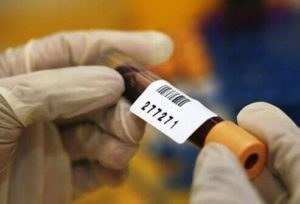C-Reactive Protein (CRP) Overview
The body produces C-reactive protein (CRP) in response to inflammation. Measuring the amount of C-reactive protein in the blood can help diagnosis and monitoring of rheumatoid arthritis.
Rheumatoid Arthritis (RA) is an autoimmune disease that causes the body to attack healthy tissues in joints. This triggers inflammation, which causes joint pain, swelling, and stiffness.
Blood tests can help confirm a diagnosis of rheumatoid arthritis. Patients with the condition often have elevated levels of certain proteins, including C-reactive protein (CRP), in their blood.
A high-sensitivity C-reactive protein (hs-CRP) test is more sensitive than a standard CRP test. This means that the high-sensitivity test can detect slight increases within the normal range of standard CRP levels.
The hs-CRP test can be used to determine the risk of developing coronary artery disease, a disease in which the arteries of the heart becomes narrow. Coronary artery disease can lead to a heart attack.
An ha-CRP test isn’t recommended for everyone. The test doesn’t show the cause of inflammation, and it’s possible that a high level could mean the inflammation isn’t affecting the heart, especially if the level is significantly higher than normal.
An hs-CRP test may be most useful for people who have a 10% to 20% chance of having a heart attack within the next 10 years, or intermediate risk. Your doctor will determine your risk level using assessment scoring tests that consider your lifestyle choices, family history and current health status.
If you’re at high risk of having a heart attack, you should always get treatment and take steps to protect your heart health, regardless of your hs-CRP level.
What is C-Reactive Protein (CRP)
The liver makes CRP, a type of protein. When the immune system signals inflammation, the body sends CRP through the bloodstream to the affected area. Doctors measure CRP by how many milligrams there are in a liter of blood (mg/l).
High levels of CRP in the blood indicate chronic inflammation. This occurs with a wide range of health problems, such as:
High CRP levels are nearly always a sign of a serious underlying medical condition. Slight and moderate elevations of 0.3–1.0 milligrams per deciliter (mg/dl), may happen in pregnant women and individuals with mild infections, diabetes, and some other medical conditions.
The most common cause of high CRP levels is a severe infection. Other possible causes include a poorly controlled autoimmune disease and severe tissue damage.
C-Reactive Protein (CRP) Test
A C-reactive protein (CRP) test measures the level of C-reactive protein, a protein made by the liver, in the blood. The liver releases CRP into your bloodstream in response to inflammation.
When your body encounters an offending agent (like viruses, bacteria or toxic chemicals) or you have an injury, it activates the immune system. Your immune system sends out its first responders: inflammatory cells and cytokines.
These cells begin an inflammatory response to trap bacteria and other offending agents or start healing injured tissue. The result can be pain, swelling, bruising or redness. But inflammation also affects body systems you can’t see, such as your joints.
Normally you have low levels of CRP in the blood. Moderately to severely elevated levels may be a sign of a serious infection or other inflammatory condition.
Purpose of C-Reactive Protein (CRP) Test
Doctor usually order’s a C-reactive protein (CRP) test to help diagnose or rule out certain conditions, including the following:
- Severe bacterial infections, such as sepsis
- Fungal infections
- Osteomyelitis (infection of the bone)
- Inflammatory Bowel Disease (IBD)
- Some forms of arthritis
- Autoimmune diseases such as rheumatoid arthritis or lupus systemic lupus erythematosus (SLE)
- Pelvic inflammatory disease (PID)
Doctors also use CRP tests to monitor people after surgery or other invasive procedures to check for infection during their recovery period.
A CRP test alone can’t diagnose a condition or where the inflammation is in your body. Because of this, providers generally order additional tests if the CRP results show that you have inflammation.
Levels of C-Reactive Protein (CRP)
Several factors, such as age and medical history, can affect an individual’s CRP levels.
| CRP level (mg/L) | Assessment |
|---|---|
| Less than 0.3 | A typical level in healthy adults |
| 0.3 – 1 | Minor elevation |
| 1-10 | Moderately elevated |
| 10-50 | Highly elevated |
| More than 50 | Severely elevated |
Conditions such as minor colds, pregnancy, and smoke inhalation can cause minor RCP elevation.
Moderate elevation typically indicates an inflammatory condition such as rheumatoid arthritis or autoimmune diseases. Marked and severe elevations are typically the result of acute infections and serious trauma.

Bay Biosciences is a global leader in providing researchers with high quality, clinical grade, fully characterized human tissue samples, bio-specimens, and human bio-fluid collections.
Samples available include cancer (tumor) tissue, cancer serum, cancer plasma, cancer, peripheral blood mononuclear cells (PBMC). and human tissue samples from most other therapeutic areas and diseases.
Bay Biosciences maintains and manages its own biorepository, the human tissue bank (biobank) consisting of thousands of diseased samples (specimens) and from normal healthy donors available in all formats and types.
Our biobank procures and stores fully consented, deidentified and institutional review boards (IRB) approved human tissue samples and matched controls.
All our human tissue collections, human specimens and human bio-fluids are provided with detailed, samples associated patient’s clinical data.
This critical patient’s clinical data includes information relating to their past and current disease, treatment history, lifestyle choices, biomarkers, and genetic information.
Patient’s data is extremely valuable for researchers and is used to help identify new effective treatments (drug discovery & development) in oncology, and other therapeutic areas and diseases.
Bay Biosciences banks wide variety of human tissue samples and biological samples, including cryogenically preserved at – 80°C.
Including fresh frozen tissue samples, tumor tissue samples, formalin-fixed paraffin-embedded (FFPE), tissue slides, with matching human bio-fluids, whole blood and blood-derived products such as serum, plasma and PBMC.
Bay Biosciences is a global leader in collecting and providing human tissue samples according to the specified requirements and customized, tailor-made collection protocols.
Please contact us anytime to discuss your special research projects and customized human tissue sample requirements.
Bay Biosciences provides human tissue samples (human specimens) from diseased and normal healthy donors which includes:
- Peripheral whole-blood
- Amniotic fluid
- Bronchoalveolar lavage fluid (BAL)
- Sputum
- Pleural effusion
- Cerebrospinal fluid (CSF)
- Serum (sera)
- Plasma
- Peripheral blood mononuclear cells (PBMC)
- Saliva
- Buffy coat
- Urine
- Stool samples
- Aqueous humor
- Vitreous humor
- Kidney stones (renal calculi)
- Other bodily fluids from most diseases including cancer.
We can also procure most human bio-specimens, special collections and requests for human samples that are difficult to find. All our human tissue samples are procured through IRB-approved clinical protocols and procedures.
In addition to the standard processing protocols, Bay Biosciences can also provide human plasma, serum, and PBMC bio-fluid samples using custom processing protocols; you buy donor-specific collections in higher volumes and specified sample aliquots from us.
Bay Biosciences also provides human samples from normal healthy donors; volunteers, for controls and clinical research, contact us Now.
日本のお客様は、ベイバイオサイエンスジャパンBay Biosciences Japanまたはhttp://baybiosciences-jp.com/contact/までご連絡ください。

